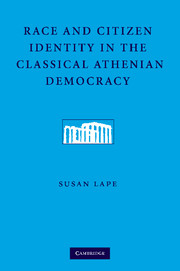Book contents
- Frontmatter
- Contents
- Preface
- Acknowledgments
- RACE AND CITIZEN IDENTITY IN THE CLASSICAL ATHENIAN DEMOCRACY
- 1 Theorizing Citizen Identity
- 2 The Rhetoric of Racial Citizenship
- 3 Euripides' “Ion” and the Family Romance of Athenian Racialism
- 4 Athenian Identity in History and as History
- 5 Trials of Citizen Identity: Policing and Producing the Racial Frontier
- 6 Myths and Realities of Racial Citizenship
- Abbreviations
- References
- Index of Names and Subjects
- Index of Passages Discussed
6 - Myths and Realities of Racial Citizenship
Published online by Cambridge University Press: 05 May 2010
- Frontmatter
- Contents
- Preface
- Acknowledgments
- RACE AND CITIZEN IDENTITY IN THE CLASSICAL ATHENIAN DEMOCRACY
- 1 Theorizing Citizen Identity
- 2 The Rhetoric of Racial Citizenship
- 3 Euripides' “Ion” and the Family Romance of Athenian Racialism
- 4 Athenian Identity in History and as History
- 5 Trials of Citizen Identity: Policing and Producing the Racial Frontier
- 6 Myths and Realities of Racial Citizenship
- Abbreviations
- References
- Index of Names and Subjects
- Index of Passages Discussed
Summary
ATHENIAN RECEPTIVITY AND RACIAL CITIZENSHIP
Racial-ideology supplied one framework in which the story of citizen identity could be told; but it was only one of several narratives the Athenians pressed into service to articulate their social identity as citizens. One of these alternative narratives was particularly in tension with racial citizenship. In a variety of public discourses, the Athenians boasted that their city was a safe haven for refugees and other afflicted outsiders. In so doing, they advanced a vision of Athenian receptivity and capacious citizenship at odds with the exclusivity of their citizenship practices and myths.
In the Archaeology, Thucydides tells us that from the earliest times refugees driven from other parts of Greece due to war or stasis (civil strife) were welcomed in Athens, where they were granted immediate citizenship. Although there is some anachronism in this report – given that a conception of citizenship did not emerge until the late seventh or early sixth century – historians have tended to see a kernel of truth in Thucydides' account, since Athens is one of the few Greek cities to have been continuously occupied from Mycenaean times straight through to the classical period. For this reason, refugees and suppliants could well have resettled in Athens at the end of the Bronze Age and later. Still, whatever historical memory for Athens' reputation as welcoming to suppliants and outsiders there may have been, scholars agree that the myths championing this behavior were emphasized, if not created altogether, only after Athens took over the leadership of the league against the Persians.
- Type
- Chapter
- Information
- Race and Citizen Identity in the Classical Athenian Democracy , pp. 240 - 284Publisher: Cambridge University PressPrint publication year: 2010



